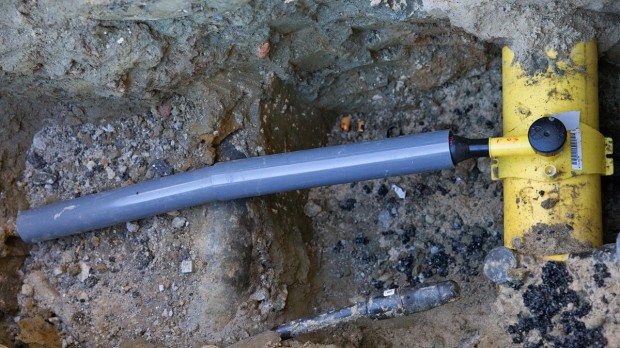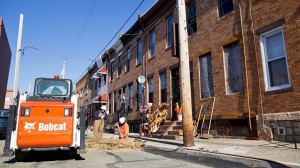PUC instructs Philadelphia Gas Works on how to accelerate pipeline-replacement program
-
Jon Hurdle

Michael Groves, PGW Senior Pipe Mechanic climbs out of a hole on Van Pelt Street after inspecting a new main gas line in North Philadelphia.
Philadelphia Gas Works should consider how to raise money to pay for the faster replacement of almost 2,000 miles of ageing cast-iron and unprotected steel mains, which pose an increasing risk to public safety, the Pennsylvania Public Utility Commission said on Tuesday.
The PUC set out seven alternatives for paying for a pipe-replacement program, which at the 2014 rate would take 66 years because of the extensive nature of the system and its presence in a densely populated urban area.
Among the options, the regulator urged PGW to consider increasing its Distribution System Improvement Charge. Raising the current cap of 5% of a consumer’s bill to 7.5% would raise $11 million and reduce the time needed to replace all hazardous pipe by 14.5 years to 51.5 years from the 2014 level.
Hiking the cap to 12% — which would add $4.42 a month to the average customer’s bill — would generate up to $31 million and cut the total replacement time to 36.8 years, the PUC said in a 93-page report.
It also said PGW could consider issuing more debt to pay for the improvements, given that its debt is projected to fall to about 56% of its capitalization by 2020, well below the 70% that the PUC estimates the utility could safely take on.
It could generate a one-time payment of $25 million by improving its cash management, and it could consider requesting that the City of Philadelphia waive all or part of the annual $18 million that it gets from PGW.
The PUC noted that 66% of the system consists of unprotected steel and cast-iron pipe, some of which dates from the early 1900s.

Lindsay Lazarski / WHYY
Philadelphia Gas Works crew members activate new plastic main lines (right) and service lines in North Philadelphia as part of an ongoing program to replace the aging cast-iron pipelines throughout the city. The older cast iron pipe can be seen beneath the new plastic pipe.
The report follows the failure late last year of a plan to privatize PGW, the nation’s largest city-owned gas utility. UIL, a Connecticut-based energy distribution company, pulled out of the plan last December after City Council declined to approve it, negating several years of negotiation by the buyer and the administration of Mayor Michael Nutter.
Backers of the UIL deal, under which the company agreed to pay $1.86 billion, argued that the massive pipe-replacement program would have been a lot quicker after privatization because a buyer would have had access to the capital markets to pay for the improvements, in contrast to the cash-strapped City.
Critics said the Council’s apparent failure to give serious consideration to the UIL offer made it unlikely that PGW would find another buyer.
But the PUC said the option of a private sale should be kept alive, alongside its suite of financing options under continued City ownership.
Variations could include a public-private partnership, an initial public offering, or a management-services agreement under which the City would retain ownership while contracting PGW’s management to a third party.
The utility may also have an opportunity to grow its revenue by developing its two liquefied natural gas facilities, which have the capacity for increased sales to markets including long-haul trucking, the report said.
The need for a major new infusion of cash is increasingly urgent given the age of the pipeline network, and its increasing fragility, as shown by a rising number of leaks, the PUC said.
PGW reported 7,600 leaks in 2014, up from 6,200 in 2013; the number of hazardous leaks rose to 3,448 last year from 3,122 in 2013.
“PGW’s aging infrastructure and leak rates are particularly concerning given that its territory is largely urban and is a high-population area, which can pose a potential threat to life,” the report said.
The replacement cost, at $1.46 million per mile, is almost twice statewide average, the report said.
While the financial challenges are daunting, the report cited the example of PSEG in New Jersey, where an ageing pipeline network would be replaced in 27 years under a recent plan, down sharply from the previous projection of 80 years.
Although the 2014 replacement rate of 66 years represented an improvement from the 88 years projected in PGW’s infrastructure improvement plan, it is still “not aggressive enough given the risk this pipe poses to PGW’s system and its customers,” the report said.
PGW spokesman Barry O’Sullivan said the options set out by the PUC were broadly familiar to PGW but that the commission’s proposals on increasing and annualizing the Distribution System Improvement Charge were grounds for discussion.
“It was very edifying for us to see that the PUC staff came to many of the same conclusions that PGW has in terms of where are the potential areas for increased funding to support our long-term infrastructure improvement plan, and possibly accelerate that,” O’Sullivan said.
The proposed DSIC changes are “areas that we have been very open to discussing,” he said. He said PGW doesn’t have firm figures in mind for any increase, and would work with the PUC on that option. He said that any increase would be made to protect Philadelphia’s large low-income population, in particular.
“Any additional cost that we are asking our ratepayers to bear accrue real benefits to them in terms of greater safety,” he said.
Making changes to the DSIC would be more appealing to PGW than changing the governance structure or negotiating a reduction in the annual payment to the city, both of which could not be done by PGW unilaterally, O’Sullivan said.
Asked whether the PUC report didn’t really offer any new solutions to PGW’s infrastructure challenges, O’Sullivan said: “The seven areas of opportunity that they most explicitly called out are areas that we’ve discussed in the past.”
PUC spokesman Nils Hagen-Fredericksen said the options were purely advisory and do not represent any requirement on PGW.
“We don’t have the ability to compel PGW to take action on these opportunities,” Hagen-Fredericksen said. But he said that some of the options would require PUC approval if the PGW decided to implement them.
“The ball is firmly back with PGW now,” he said.
Mark McDonald, a spokesman for Mayor Nutter, said the mayor welcomes a “dialogue” between the PUC and PGW on ways to improve pipelines but that it does not support any “repurposing” of the $18 million that the utility makes to the city each year, or the issuing of new debt for pipe replacement.
The PUC’s report comes as the Obama Administration rolled out proposals to upgrade the nation’s energy infrastructure, which includes the plan to spend between $2.5 to $3.5 billion helping states upgrade distribution pipelines.

















